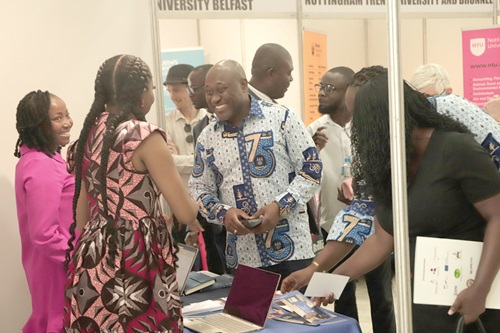
Make International higher education more inclusive — Expert to universities
An expert in International Higher Education has called on both public and private universities in the country to take advantage of new global opportunities and leverage technology to make the internationalisation of education, more inclusive and sustainable for their respective students and staff.
The expert, an Emeritus Professor and Distinguished Fellow at the Center for International Higher Education at Boston College, United States of America, Prof. Hans de Wit, further advised the universities not to imitate what happens in the Western world, but to design their own IHE programmes to suit the development needs and interests of the Ghanaian society to promote equity.
Internationalisation of higher education, he explained in theory is "The process of integrating an international, intercultural, or global dimension into the purpose, functions or delivery of post-secondary education”.
He spoke virtually at a symposium on “rethinking internationalisation in Africa: the equity question" in Accra last Thursday. Organised by the International Programmes Office(IPO) of the University of Ghana, Legon, with funding from the German Agency for International Cooperation(GIZ), the symposium formed part of the IPO's International Week celebration.
It was aimed at assessing the impact of internalisation on higher education and equity. About 50 universities from Ghana and abroad, with 27 exhibitors took part in the event.
Perception
Delivering a lecture to set the tone for discussions, Prof. Wit said internationalisation of education had been “Perceived as a western paradigm dominated by the discourse, action and knowledge dominance of the global North”.
He stated that less than one per cent of African students have the opportunity to travel abroad for their studies and that sounds elitist stressing that it was also elitist to know that only a few institutions globally were updating their list to include international students for their programmes.
“Equity is a very serious concern for internationalisation in Africa. How can this narrative be changed?” he asked.
Mobility needs
Educating his audience further, he argued that academic mobility refers to students and teachers in higher education moving to another institution inside or outside of their country to study or teach for a limited time.
“This must be done based on the needs and interests of the students, staff and universities in the country and Africa as a whole. “It should not be a one-size-fits-all scenario. It should be done within the context of your country, region and this is relevant to develop and boost the economy in your country and Africa as a whole.” Prof. Wit advised.
Trusted partners
In a second lecture, the Rector for International Affairs of the University of Bonn, Germany, Prof. Dr Birgit Ulrike Munch, said in promoting the internationalisation of higher education, there was a need for trust to be built among the institutions involved in the exercise and commended the University of Ghana for being a trusted partner in exchange programmes over the years.
She mentioned travel restrictions, strict regulations and laws as some of the hindrances to effective IHE. Prof. Dr Munch said the German government had rolled out some scholarship programmes and provided funds to support students from the country that had eventually built their respective capacities.
Panellists
Panellists to the discussions were the Interim Vice President for International Affairs for Indiana University, Dr Hilary E. Kahn; and the Director, of HAFL Hugo P. Ceccihini Institute, Bern University of Applied Sciences, Switzerland, Prof. Zenebe Uraguchi.
The rest are the Senior Programme Manager, Student Mobility, Stellenbosch University, South Africa, Dr Werner de Wit; Founder and President of Ashesi University, Ghana, Dr Patrick Gyimah Awuah Jnr.; and the Regional Director, Africa and the Middle East, University of Edinburgh, Scotland, Dr Seth Amanfo.
The panellists mentioned fairness, equity, transactional issues, regional context, strategic partnerships, and exploitative partnerships as some of the challenges to consider in ensuring a sustainable IHE.
Allow students
The German Ambassador to Ghana, Daniel Krull, for his part, said students must be allowed to choose wherever they would want to study and develop their careers. “We don't own any of these students, they have the right to go wherever they want; it is not for us to decide where the student should go,” he stated.
Other speakers at the symposium were the Dean of International Programmes, Prof. Eric Osei-Assibey and the Pro-Vice Chancellor of Academic and Student Affairs of the University of Ghana, Prof. Gordon Awandare.
